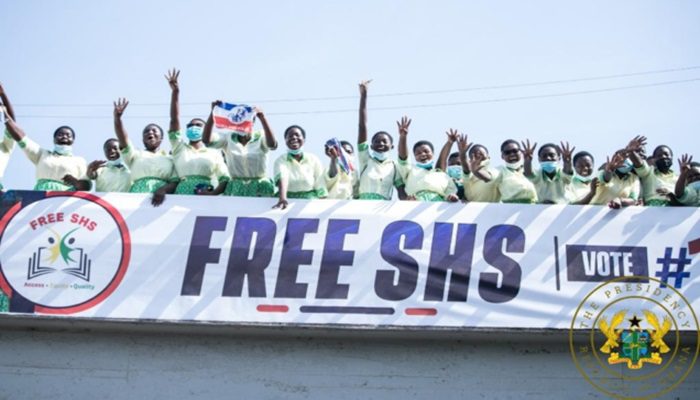Former Director-General of the Ghana Education Service (GES), Prof Kwasi Opoku-Amankwa, has cautioned that approximately 1.8 million Ghanaian students could lose access to free senior high school (FSHS) and technical vocational education and training (TVET) if the double track system is abolished.
The warning comes in response to a campaign pledge by former President John Dramani Mahama and the National Democratic Congress (NDC) to cancel the double track system within 100 days if elected.
How the Double Track System Works
Prof. Opoku-Amankwa, one of the architects of the Free SHS implementation, explained that the double track system, which has transitioned to a more flexible calendar, enables schools to fully utilize available space and infrastructure.
Instead of dividing student bodies into “Green” and “Gold” tracks, as was done when the system was first introduced, the transitional calendar allows two out of the three senior high school (SHS) year groups to be in school at any given time.
“Under this calendar, schools maximize infrastructure use without sacrificing quality,” he stated. “Teacher-student contact hours now total 1,134 per academic year, up from 1,080 under the old system, giving students 162 additional hours over three years.”
Increased access and improved performance
Prof. Opoku-Amankwa pointed to the improvements in students’ performance in the West African Senior School Certificate Examination (WASSCE) since the introduction of the Free SHS and double track system.
450,000 students cannot access Free SHS
He noted that around 450,000 students would be excluded from FSHS/TVET each year if the current school system is hastily reversed, ultimately denying access to an estimated 1.8 million students from 2025 to 2028.
300 schools running the double track
“With about 300 schools running the double track or transitional calendar, moving back to the old system would lead to substantial access loss,” he explained.
“The double track has allowed more students than ever before to benefit from free secondary education, ” he added.
Infrastructure and staffing investments
The former GES Director-General credited the transitional calendar’s success to significant infrastructure investments made by the government since 2017.
4,000 projects completed for SHS
Through the Ghana Education Trust Fund (GETFund) and other initiatives, the government has completed over 4,000 projects, including dormitories, classrooms, and science laboratories, across secondary and technical campuses nationwide as of September 2024.
50,000 teaching and non-teaching staff
Additionally, over 50,000 teaching and non-teaching staff have been employed to support SHS/TVET students, ensuring that educational quality is maintained.
The government has also provided critical learning materials to students under this system.
Concerns over policy reversal
Prof. Opoku-Amankwa cautioned that any abrupt attempt to dismantle the double track system could have detrimental effects on the Free SHS policy, which is currently at the heart of Ghana’s commitment to free secondary education.
He suggested that abolishing the double track within the first 100 days of an administration, as the NDC has proposed, may undermine the entire FSHS program.
“To target 100% transition from junior high school to senior high, as currently set by the government, we need careful planning,” he advised. “Cancelling the double track now would not only put an estimated 1.8 million students at risk but could also lead to a decline in quality and access across the system,” he stated
A call for strategic decisions in education policy
The double track system has been a point of contention, with critics arguing that it strains resources and compromises quality.
However, advocates like Prof. Opoku-Amankwa argue that the system is crucial for accommodating the large influx of students brought about by the Free SHS policy.
With an estimated 83% of students currently transitioning from junior to senior high school, the goal remains to reach 100%.
“We must resist the temptation to abolish the double track or transitional calendar purely for political expediency. For the sake of the next generation, it is critical to prioritize sustainable solutions that will secure quality education for every Ghanaian child,” he cautioned.
How double track/transitional calendar works
To better understand and appreciate the importance of double track/transitional calendar, let us take a school with 3,000 available spaces.
Under the old single track/trimester system, the school can enroll a maximum of 3,000 students per academic year. That is, an average of 1,000 students each for Form 1, Form 2, and Form 3.
Under the double track/transitional calendar and semester system however, the school is able to enroll 4,500 students using the same 3,000 spaces; each of the three-year groups is able to enroll 1,500 students.
This is made possible because two out of the three-year groups will be in school at any given time.
As an all-year-round school calendar, the double track/transitional calendar provides these scenarios:
Form 1 and Form 2 in school, Form 3 on vacation
Form 2 and Form 3 in school, Form 1 on vacation
Form 3 and Form 1 in school, Form 2 on vacation
With the continued increase in patronage in the FSHS/TVET, Dr. Mahamudu Bawumia and the NPP have promised to protect and enhance the Free Secondary Education policy, with a strong emphasis on TVET and STEM, by continuing to fully fund the policy.
- Inflation Rate falls marginally to 21.2%in April - 8 May 2025
- Kidnapped victims: Efforts underway to bring them home – CID boss - 8 May 2025
- Thursday, May 8, 2025 Newspaper Headlines - 8 May 2025




